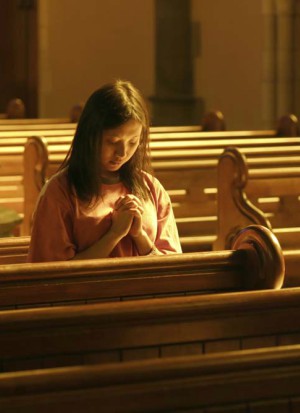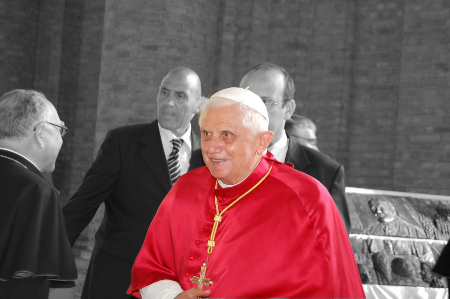We ask you, humbly: don't scroll away.
Hi readers, it seems you use Catholic Online a lot; that's great! It's a little awkward to ask, but we need your help. If you have already donated, we sincerely thank you. We're not salespeople, but we depend on donations averaging $14.76 and fewer than 1% of readers give. If you donate just $5.00, the price of your coffee, Catholic Online School could keep thriving. Thank you.Help Now >
Non-liturgical Music in Cathedrals
FREE Catholic Classes
ROME, SEPT. 20, 2006 (Zenit) - Answered by Father Edward McNamara, professor of liturgy at the Regina Apostolorum university.
Q: In what circumstances can a cathedral be used for a non-liturgical purpose such as a concert of secular operatic arias? -- B.N., Bunbury Australia
A: This theme was addressed in a declaration on "Concerts in Churches" published by the Congregation for Divine Worship and the Sacraments in November 1987 (Protocol No. 1251/87). The English version of the text appeared in Sacred Music, Volume 114, N. 4 (Winter) 1987. Among other sites it is available electronically at adoremus.org.
For brevity, we will limit ourselves to quoting its practical norms. It is also possible that individual bishops' conferences or even individual bishops publish norms that apply these principles to concrete situation:
"III. Practical Directives
"8. The regulation of the use of churches is stipulated by canon 1210 of the Code of Canon Law:
"In a sacred place only those things are to be permitted which serve to exercise or promote worship, piety and religion. Anything out of harmony with the holiness of the place is forbidden. The Ordinary may, however, for individual cases, permit other uses, provided they are not contrary to the sacred character of the place.
"The principle that the use of the church must not offend the sacredness of the place determines the criteria by which the doors of a church may be opened to a concert of sacred or religious music, as also the concomitant exclusion of every other type of music. The most beautiful symphonic music, for example, is not in itself of religious character. The definition of sacred or religious music depends explicitly on the original intended use of the musical pieces or songs, and likewise on their content. It is not legitimate to provide for the execution in the church of music which is not of religious inspiration and which was composed with a view to performance in a certain precise secular context, irrespective of whether the music would be judged classical or contemporary, of high quality or of a popular nature. On the one hand, such performances would not respect the sacred character of the church, and on the other, would result in the music being performed in an unfitting context ....
"9. Sacred music, that is to say music which was composed for the Liturgy, but which for various reasons can no longer be performed during a liturgical celebration, and religious music, that is to say music inspired by the text of sacred scripture or the Liturgy and which has reference to God, the Blessed Virgin Mary, to the saints or to the Church, may both find a place in the church building, but outside liturgical celebration. The playing of the organ or other musical performance, whether vocal or instrumental, may: 'serve to promote piety or religion.' In particular they may:
"a. prepare for the major liturgical feasts, or lend to these a more festive character beyond the moment of actual celebration; b. bring out the particular character of the different liturgical seasons; c. create in churches a setting of beauty conducive to meditation, so as to arouse even in those who are distant from the Church an openness to spiritual values; d. create a context which favors and makes accessible the proclamation of God's word, as for example, a sustained reading of the Gospel; e. keep alive the treasures of Church music which must not be lost; musical pieces and songs composed for the Liturgy but which cannot in any way be conveniently incorporated into liturgical celebrations in modern times; spiritual music, such as oratorios and religious cantatas which can still serve as vehicles for spiritual communication; f. assist visitors and tourists to grasp more fully the sacred character of a church, by means of organ concerts at prearranged times.
"10. When the proposal is made that there should be a concert in a church, the Ordinary is to grant the permission 'per modum actus.' These concerts should be occasional events. This excludes permission for a series of concerts, for example in the case of a festival or a cycle of concerts.
"When the Ordinary considers it to be necessary, he can, in the conditions foreseen in the Code of Canon Law (can. 1222, para. 2) designate a church that is no longer used for divine service, to be an 'auditorium' for the performance of sacred or religious music, and also of music not specifically religious but in keeping with the character of the place.
"In this task the bishop should be assisted by the diocesan commission for Liturgy and sacred music.
"In order that the sacred character of a church be conserved in the matter of concerts, the Ordinary can specify that:
"a. Requests are to be made in writing, in good time, indicating the date and time of the proposed concert, the program, giving the works and the names of the composers.
"b. After having received the authorization of the Ordinary, the rectors and parish priests of the churches should arrange details with the choir and orchestra so that the requisite norms are observed.
"c. Entrance to the church must be without payment and open to all.
"d. The performers and the audience must be dressed in a manner which is fitting to the sacred character of the place.
"e. The musicians and the singers should not be placed in the sanctuary. The greatest respect is to be shown to the altar, the president's chair and the ambo.
"f. The Blessed Sacrament should be, as far as possible, reserved in a side chapel or in another safe and suitably adorned place (Cf. C.I.C., can 928, par. 4).
"g. The concert should be presented or introduced not only with historical or technical details, but also in a way that fosters a deeper understanding and an interior participation on the part of the listeners.
"h. The organizer of the concert will declare in writing that he accepts legal responsibilities for expenses involved, for leaving the church in order and for any possible damage incurred.
"11. The above practical directives should be of assistance to the bishops and rectors of churches in their pastoral responsibility to maintain the sacred character of their churches, designed for sacred celebrations, prayer and silence."
Contact
Catholic Online
https://www.catholic.org
CA, US
Catholic Online - Publisher, 661 869-1000
info@yourcatholicvoice.org
Keywords
Music, Cathedrals, McNamara, Liturgy
More Catholic PRWire
Showing 1 - 50 of 4,716
A Recession Antidote
Randy Hain
Monaco & The Vatican: Monaco's Grace Kelly Exhibit to Rome--A Review of Monegasque-Holy See Diplomatic History
Dna. Maria St. Catherine Sharpe, t.o.s.m., T.O.SS.T.
The Why of Jesus' Death: A Pauline Perspective
Jerom Paul
A Royal Betrayal: Catholic Monaco Liberalizes Abortion
Dna. Maria St.Catherine De Grace Sharpe, t.o.s.m., T.O.SS.T.
Embrace every moment as sacred time
Mary Regina Morrell
My Dad
JoMarie Grinkiewicz
Letting go is simple wisdom with divine potential
Mary Regina Morrell
Father Lombardi's Address on Catholic Media
Catholic Online
Pope's Words to Pontifical Latin American College
Catholic Online
Prelate: Genetics Needs a Conscience
Catholic Online
State Aid for Catholic Schools: Help or Hindrance?
Catholic Online
Scorsese Planning Movie on Japanese Martyrs
Catholic Online
2 Nuns Kidnapped in Kenya Set Free
Catholic Online
Holy See-Israel Negotiation Moves Forward
Catholic Online
Franchising to Evangelize
Catholic Online
Catholics Decry Anti-Christianity in Israel
Catholic Online
Pope and Gordon Brown Meet About Development Aid
Catholic Online
Pontiff Backs Latin America's Continental Mission
Catholic Online
Cardinal Warns Against Anti-Catholic Education
Catholic Online
Full Circle
Robert Gieb
We ask you, humbly: don't scroll away.
Hi readers, it seems you use Catholic Online a lot; that's great! It's a little awkward to ask, but we need your help. If you have already donated, we sincerely thank you. We're not salespeople, but we depend on donations averaging $14.76 and fewer than 1% of readers give. If you donate just $5.00, the price of your coffee, Catholic Online School could keep thriving. Thank you.Help Now >
Three words to a deeper faith
Paul Sposite
Relections for Lent 2009
chris anthony
Wisdom lies beyond the surface of life
Mary Regina Morrell
World Food Program Director on Lent
Catholic Online
Moral Clarity
DAN SHEA
Pope's Lenten Message for 2009
Catholic Online
A Prayer for Monaco: Remembering the Faith Legacy of Prince Rainier III & Princess Grace and Contemplating the Moral Challenges of Prince Albert II
Dna. Maria St. Catherine Sharpe
Keeping a Lid on Permissiveness
Sally Connolly
Glimpse of Me
Sarah Reinhard
The 3 stages of life
Michele Szekely
Sex and the Married Woman
Cheryl Dickow
A Catholic Woman Returns to the Church
Cheryl Dickow
Modernity & Morality
Dan Shea
Just a Minute
Sarah Reinhard
Catholic identity ... triumphant reemergence!
Hugh McNichol
Edging God Out
Paul Sposite
Burying a St. Joseph Statue
Cheryl Dickow
George Bush Speaks on Papal Visit
Catholic Online
Sometimes moving forward means moving the canoe
Mary Regina Morrell
Action Changes Things: Teaching our Kids about Community Service
Lisa Hendey
Easter... A Way of Life
Paul Spoisite
Papal initiative...peace and harmony!
Hugh McNichol
Proclaim the mysteries of the Resurrection!
Hugh McNichol
Jerusalem Patriarch's Easter Message
Catholic Online
Good Friday Sermon of Father Cantalamessa
Catholic Online
Papal Address at the End of the Way of the Cross
Catholic Online
Cardinal Zen's Meditations for Via Crucis
Catholic Online
Interview With Vatican Aide on Jewish-Catholic Relations
Catholic Online
Pope Benedict XVI On the Easter Triduum
Catholic Online
Holy Saturday...anticipation!
Hugh McNichol
 Hi readers, it seems you use Catholic Online a lot; that's great! It's a little awkward to ask, but we need your help. If you have already donated, we sincerely thank you. We're not salespeople, but we depend on donations averaging $14.76 and fewer than 1% of readers give. If you donate just $5.00, the price of your coffee, Catholic Online School could keep thriving. Thank you. Help Now >
Hi readers, it seems you use Catholic Online a lot; that's great! It's a little awkward to ask, but we need your help. If you have already donated, we sincerely thank you. We're not salespeople, but we depend on donations averaging $14.76 and fewer than 1% of readers give. If you donate just $5.00, the price of your coffee, Catholic Online School could keep thriving. Thank you. Help Now >










 Daily Readings for Thursday, April 18, 2024
Daily Readings for Thursday, April 18, 2024 St. Apollonius the Apologist: Saint of the Day for Thursday, April 18, 2024
St. Apollonius the Apologist: Saint of the Day for Thursday, April 18, 2024 Aspiration: Prayer of the Day for Thursday, April 18, 2024
Aspiration: Prayer of the Day for Thursday, April 18, 2024

